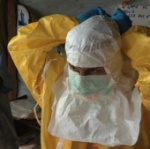Reflection: Combating with Love - The Case of Ebola

Medic dons protective gear
The chaos related to the Ebola virus has led to the stigmatization of those infected with the disease, their families and on a global level, the affected countries and Africa as a whole. Now with some cases being recorded in other parts of the world, fear of an uncontrollable disease with a potential to eliminate humanity looms. While every possible precaution is required to combat its spread, the stigma of the victims, the affected countries and Africa deepens.
However, it is the media’s obligation to help those involved in the fight to inform the public with the correct and helpful information. This is the only way we can explore uncharted territory in combating the Ebola scourge. Instead of finding a solution to a problem, stigmatization is an unhealthy response to a crisis. It cripples all efforts for progress. And it creates a culture of blame. As a result anyone that may possibly be infected will be afraid to come forward for treatment for fear of being victimized with the community’s wrath of rejection.
Furthermore, the stigmatization of West Africa as the epicentre of the contagion is bound to have devastating consequences on health, education, the economy, the environment and social cohesion. No region has ever managed to prevent such outbreaks.
The Black Death, Spanish influenza, avian flu, BSE, foot-and-mouth disease and SARS are just some in a long list of transmissible viruses that wreaked havoc and paralysed societies across the five continents. And if we are to emulate the adage “Wisdom is experience reflected upon,” it is good to draw lessons from our experiences with these deadly infectious diseases.
Stereotyping and fear limits the chances of nipping the disease in the bud. People are afraid to travel to West Africa and to some extent, Africa as a whole. Visits, conferences and business trips have been cancelled.
Stigma is usually a normal reaction that human beings take in self-preservation. The Bible gives us a classic case of stigma arising from leprosy. (What biblical leprosy is was uncertain. Many interpret it as a range of virulent skin diseases). Lacking a cure, society organized itself to handle a perceived danger to others. The priests’ role was to decide if the diseased person was clean or unclean based on symptoms – white or raw skin for example. “When a person contracts a leprous disease, he shall be brought to a priest. (Leviticus 13: 9).” If the disease was serious, the leper was required to follow specific societal rules to limit the potential exposure to others. “The person who has the leprous disease shall wear torn clothes … and cry out unclean unclean… He shall remain unclean as long as he has the disease … He shall live alone; his dwelling shall be outside the camp. (Leviticus 13: 1-14).”
While it was important to protect the community from those infected with leprosy, the problem that arose was that those infected suffered the wrath of being dehumanized. We have learnt throughout history that dehumanizing a person through whatever form is a punishment worse than death. No wonder we see Jesus healing the lepers with the aim of restoring them back to the community and affirming their humanity. Jesus’ loving response to the plight of the lepers is an important lesson to emulate.
Follow the Jesuit Institute on twitter @JesuitInstitute


















